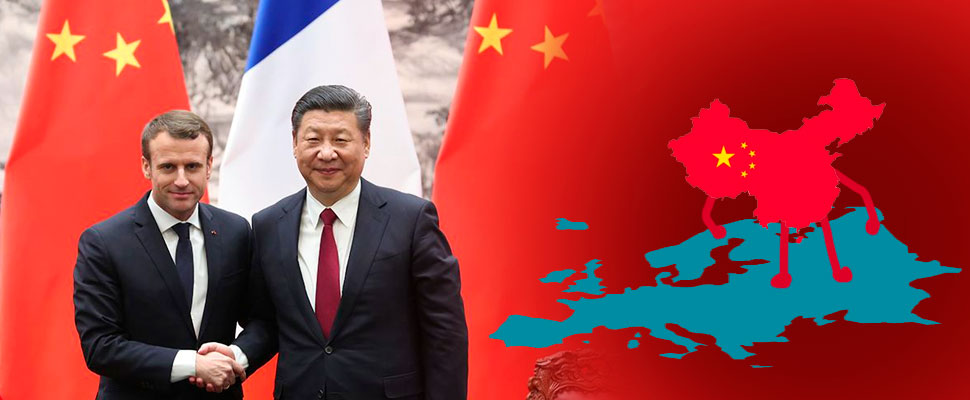China takes Europe: what the global governance forum left
Listen this article
Multilateralism and agreements on the treatment of global issues are part of the strategy with which China seeks to get closer to Europe

During his European tour, Chinese President Xi Jinping met with French President Emmanuel Macron, German Chancellor Angela Merkel and European Commission President Jean-Claude Juncker. The leaders discussed bilateral issues, international cooperation, trade agreements, and global issues, in which both Europe and China have a leading role.
Leer en español: China se toma Europa: lo que dejó el foro de gobernanza global
Beyond that, the meeting has an additional connotation: it was a dialogue between the four leaders, in which the current conditions of the mutual relationship were analyzed, as well as the efforts that must be made to harmonize it. All this happened in a context where the world order and global geopolitics seem to be oriented towards unilateralism and the protectionism of the economy.
This is how during a global governance forum, co-organized between France and China on March 26, both Xi and Macron, along with Merkel and Juncker, agreed to strengthen relations between the European Union and China, along with cooperation in global governance, working on aspects such as multilateralism and current global challenges.
According to the portal Xinhua en español, Xi Jinping's goal is "to increase communication and cooperation with Europe within the framework of the UN, actively striving to achieve more achievements in the resolution of international disputes, through political means, in the fight against climate change and the promotion of sustainable development, among other areas". In addition, he assured that his country will promote bilateral cooperation and third-party markets, to achieve mutual benefit and to report shared profits for all parties.
You can also read: Brexit: the final day is approaching
Improve mutual trust
Another theme that was developed in the meeting was the improvement of mutual trust between the Asian power and Europe, as a fundamental part to strengthen the bilateral relationship and advance joint cooperation and other common issues.
"China has always considered the EU as a strategic cooperation partner and has supported the solidarity, stability, and prosperity of the European bloc. China and Europe have more common interests than differences," said the Chinese president, quoted by Xinhua, who also mentioned that the Asian leader "exhorted both sides to take the initiative in the defense of peace, development, and cooperation of mutual benefit, and to make the role of cooperation bigger."
Beyond the friendly and conciliatory words of Xi Jinping, the improvement of trust between Europe and China, as well as the narrowing of their relations, are also mediated by certain conditions raised by Europe, especially in economic matters. These seek equitable conditions and reciprocity in the agreements made by both parties.
In this sense, the newspaper El País noted that "faced with a disorderly world order, the Europeans try to place themselves between the unilateralism of the United States of Donald Trump and the strength of the China of Xi Jinping. The French president, Emmanuel Macron, tried to present a common front of the EU before his Chinese counterpart, in front of Xi's more convenient bilateral pacts. Macron, the German chancellor, Angela Merkel and the president of the European Commission, Jean-Claude Juncker, also demanded from Beijing reciprocity in the conditions of investment and trade in both markets."
Judging by Juncker's words, it is evident that, even with Xi Jinping's willingness to have a much more fluid relationship with Europe, the prevention and suspicion about what China wants with Europe or what is the real goal of approaching European leaders is real: "China and Europe must and can do great things together. We are strategic partners and, yes, rivals – it is a compliment".
President @JunckerEU on the relation:
« China and Europe must and can do great things together. We are strategic partners and, yes, rivals – it is a compliment. » #EUChina pic.twitter.com/T1npYcJp8M— European Commission (@EU_Commission) 26 de marzo de 2019
To which he added: "Europe, united, wants a deep partnership with China, based on reciprocity, and is committed to a fair and effective multilateralism."
L’Europe, unie, souhaite un partenariat approfondi avec la Chine, fondé sur la réciprocité, et s’engage pour un multilatéralisme juste et efficace. pic.twitter.com/XqoC8BcHf4
— Jean-Claude Juncker (@JunckerEU) 26 de marzo de 2019
For his part, through his Twitter account, President Emmanuel Macron said: "European Union and China, together to face global challenges."
Union européenne et Chine.
Ensemble pour répondre aux défis mondiaux. pic.twitter.com/Vm45wAgecN— Emmanuel Macron (@EmmanuelMacron) 26 de marzo de 2019
Among these global challenges, Macron referred to climate change and said: "reduction of greenhouse gases, efficiency of energy standards, reorientation of financial flows, alignment of development banks in the Paris Agreement. With China we are making progress in the climate."
Réduction des gaz à effet de serre, efficacité des standards énergétiques, réorientation des flux financiers, alignement des banques de développement sur l'Accord de Paris… Avec la Chine, on avance sur le climat. pic.twitter.com/330OSDfGXy
— Emmanuel Macron (@EmmanuelMacron) 25 de marzo de 2019
Following this tendency, the Euronews portal highlighted the signing of fifteen new multi-million dollar contracts between France and China, as well as the signing of a new agreement that will allow the company Électricité de France (EDF) to build a marine wind farm in China, with an investment of 1 billion euros. Euronews also stressed that Beijing, for its part, will lift the embargo on exports of poultry products.
"The visit to Paris of Chinese President Xi Jinping has been a boost to the ambitions of Beijing, according to French President Emmanuel Macron, resting on loyalty and balance. Xi has made it clear that China will always support European integration and development and that a united and prosperous Europe responds to its vision of a multipolar world," added Euronews.
You can also read: Neither Maduro nor Guaidó! The diplomatic clash between the US and Russia
The impact on Latin America
This new moment of relations between China and the European Union may have an impact on Latin America in some way, considering that, together with Russia, China is one of the main allies of Nicolás Maduro's government in Venezuela and that, although France has accompanied the United States in its position and pressures against the Maduro regime, Germany has reconsidered to follow that position, not recognizing the ambassador appointed by the 'self-proclaimed' president of Venezuela, Juan Guaidó.
LatinAmerican Post | Samuel Augusto Gallego Suárez
Translated from "China se toma Europa: lo que dejó el foro de gobernanza global"





